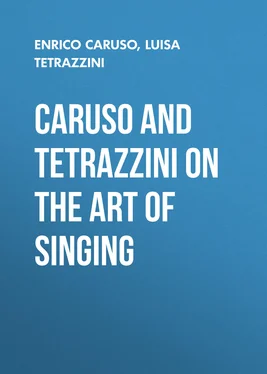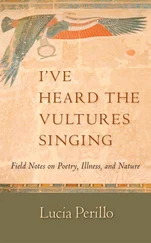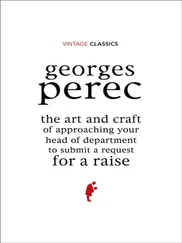Luisa Tetrazzini - Caruso and Tetrazzini on the Art of Singing
Здесь есть возможность читать онлайн «Luisa Tetrazzini - Caruso and Tetrazzini on the Art of Singing» — ознакомительный отрывок электронной книги совершенно бесплатно, а после прочтения отрывка купить полную версию. В некоторых случаях можно слушать аудио, скачать через торрент в формате fb2 и присутствует краткое содержание. Жанр: foreign_antique, foreign_home, music_dancing, на английском языке. Описание произведения, (предисловие) а так же отзывы посетителей доступны на портале библиотеки ЛибКат.
- Название:Caruso and Tetrazzini on the Art of Singing
- Автор:
- Жанр:
- Год:неизвестен
- ISBN:нет данных
- Рейтинг книги:4 / 5. Голосов: 1
-
Избранное:Добавить в избранное
- Отзывы:
-
Ваша оценка:
- 80
- 1
- 2
- 3
- 4
- 5
Caruso and Tetrazzini on the Art of Singing: краткое содержание, описание и аннотация
Предлагаем к чтению аннотацию, описание, краткое содержание или предисловие (зависит от того, что написал сам автор книги «Caruso and Tetrazzini on the Art of Singing»). Если вы не нашли необходимую информацию о книге — напишите в комментариях, мы постараемся отыскать её.
Caruso and Tetrazzini on the Art of Singing — читать онлайн ознакомительный отрывок
Ниже представлен текст книги, разбитый по страницам. Система сохранения места последней прочитанной страницы, позволяет с удобством читать онлайн бесплатно книгу «Caruso and Tetrazzini on the Art of Singing», без необходимости каждый раз заново искать на чём Вы остановились. Поставьте закладку, и сможете в любой момент перейти на страницу, на которой закончили чтение.
Интервал:
Закладка:
Enrico Caruso
Caruso and Tetrazzini on the Art of Singing
PREFACE
In offering this work to the public the publishers wish to lay before those who sing or who are about to study singing, the simple, fundamental rules of the art based on common sense. The two greatest living exponents of the art of singing—Luisa Tetrazzini and Enrico Caruso—have been chosen as examples, and their talks on singing have additional weight from the fact that what they have to say has been printed exactly as it was uttered, the truths they expound are driven home forcefully, and what they relate so simply is backed by years of experience and emphasized by the results they have achieved as the two greatest artists in the world.
Much has been said about the Italian Method of Singing. It is a question whether anyone really knows what the phrase means. After all, if there be a right way to sing, then all other ways must be wrong. Books have been written on breathing, tone production and what singers should eat and wear, etc., etc., all tending to make the singer self-conscious and to sing with the brain rather than with the heart. To quote Mme. Tetrazzini: "You can train the voice, you can take a raw material and make it a finished production; not so with the heart."
The country is overrun with inferior teachers of singing; men and women who have failed to get before the public, turn to teaching without any practical experience, and, armed only with a few methods, teach these alike to all pupils, ruining many good voices. Should these pupils change teachers, even for the better, then begins the weary undoing of the false method, often with no better result.
To these unfortunate pupils this book is of inestimable value. He or she could not consistently choose such teachers after reading its pages. Again the simple rules laid down and tersely and interestingly set forth not only carry conviction with them, but tear away the veil of mystery that so often is thrown about the divine art.
Luisa Tetrazzini and Enrico Caruso show what not to do, as well as what to do, and bring the pupil back to first principles—the art of singing naturally.
LUISA TETRAZZINI
Introductory Sketch of the Career of the World-Famous Prima Donna
Luisa Tetrazzini, the most famous Italian coloratura soprano of the day, declares that she began to sing before she learned to talk. Her parents were not musical, but her elder sister, now the wife of the eminent conductor Cleofante Campanini, was a public singer of established reputation, and her success roused her young sister's ambition to become a great artist. Her parents were well to do, her father having a large army furnishing store in Florence, and they did not encourage her in her determination to become a prima donna. One prima donna, said her father, was enough for any family.
Luisa did not agree with him. If one prima donna is good, she argued, why would not two be better? So she never desisted from her importunity until she was permitted to become a pupil of Professor Coccherani, vocal instructor at the Lycée. At this time she had committed to memory more than a dozen grand opera rôles, and at the end of six months the professor confessed that he could do nothing more for her voice; that she was ready for a career.
She made her bow to the Florentine opera going public, one of the most critical in Italy, as Inez, in Meyerbeer's "L'Africaine," and her success was so pronounced that she was engaged at a salary of $100 a month, a phenomenal beginning for a young singer. Queen Margherita was present on the occasion and complimented her highly and prophesied for her a great career. She asked the trembling débutante how old she was, and in the embarrassment of the moment Luisa made herself six years older than she really was. This is one noteworthy instance in which a public singer failed to discount her age.
Fame came speedily, but for a long time it was confined to Europe and Latin America. She sang seven seasons in St. Petersburg, three in Mexico, two in Madrid, four in Buenos Aires, and even on the Pacific coast of America before she appeared in New York. She had sung Lucia more than 200 times before her first appearance at Covent Garden, and the twenty curtain calls she received on that occasion came as the greatest surprise of her career. She had begun to believe that she could never be appreciated by English-speaking audiences and the ovation almost overcame her.
It was by the merest chance that Mme. Tetrazzini ever came to the Manhattan Opera House in New York. The diva's own account of her engagement is as follows:
"I was in London, and for a wonder I had a week, a wet week, on my hands. You know people will do anything in a wet week in London.
"There were contracts from all over the Continent and South America pending. There was much discussion naturally in regard to settlements and arrangements of one kind and another.
"Suddenly, just like that"—she makes a butterfly gesture—"M. Hammerstein came, and just like that"—a duplicate gesture—"I made up my mind that I would come here. If his offer to me had been seven days later I should not have signed, and if I had not I should undoubtedly never have come, for a contract that I might have signed to go elsewhere would probably have been for a number of years."
Voice experts confess that they are not able to solve the mystery of Mme. Tetrazzini's wonderful management of her breathing.
"It is perfectly natural," she says. "I breathe low down in the diaphragm, not, as some do, high up in the upper part of the chest. I always hold some breath in reserve for the crescendos, employing only what is absolutely necessary, and I renew the breath wherever it is easiest.
"In breathing I find, as in other matters pertaining to singing, that as one goes on and practices, no matter how long one may have been singing, there are constantly new surprises awaiting one. You may have been accustomed for years to take a note in a certain way, and after a long while you discover that, while it is a very good way, there is a better."
Breath Control The Foundation of Singing
There is only one way to sing correctly, and that is to sing naturally, easily, comfortably.
The height of vocal art is to have no apparent method, but to be able to sing with perfect facility from one end of the voice to the other, emitting all the notes clearly and yet with power and having each note of the scale sound the same in quality and tonal beauty as the ones before and after.
There are many methods which lead to the goal of natural singing—that is to say, the production of the voice with ease, beauty and with perfect control.
Some of the greatest teachers in the world reach this point apparently by diverging roads.
Around the art of singing there has been formed a cult which includes an entire jargon of words meaning one thing to the singer and another thing to the rest of the world and which very often doesn't mean the same thing to two singers of different schools.
In these talks with you I am going to try to use the simplest words, and the few idioms which I will have to take from my own language I will translate to you as clearly as I can, so that there can be no misunderstanding.
Certainly the highest art and a lifetime of work and study are necessary to acquire an easy emission of tone.
There are quantities of wonderful natural voices, particularly among the young people of Switzerland and Italy, and the American voice is especially noted for its purity and the beauty of its tone in the high registers. But these naturally untrained voices soon break or fail if they are used much unless the singer supplements the natural, God-given vocal gifts with a conscious understanding of how the vocal apparatus should be used.
Читать дальшеИнтервал:
Закладка:
Похожие книги на «Caruso and Tetrazzini on the Art of Singing»
Представляем Вашему вниманию похожие книги на «Caruso and Tetrazzini on the Art of Singing» списком для выбора. Мы отобрали схожую по названию и смыслу литературу в надежде предоставить читателям больше вариантов отыскать новые, интересные, ещё непрочитанные произведения.
Обсуждение, отзывы о книге «Caruso and Tetrazzini on the Art of Singing» и просто собственные мнения читателей. Оставьте ваши комментарии, напишите, что Вы думаете о произведении, его смысле или главных героях. Укажите что конкретно понравилось, а что нет, и почему Вы так считаете.











